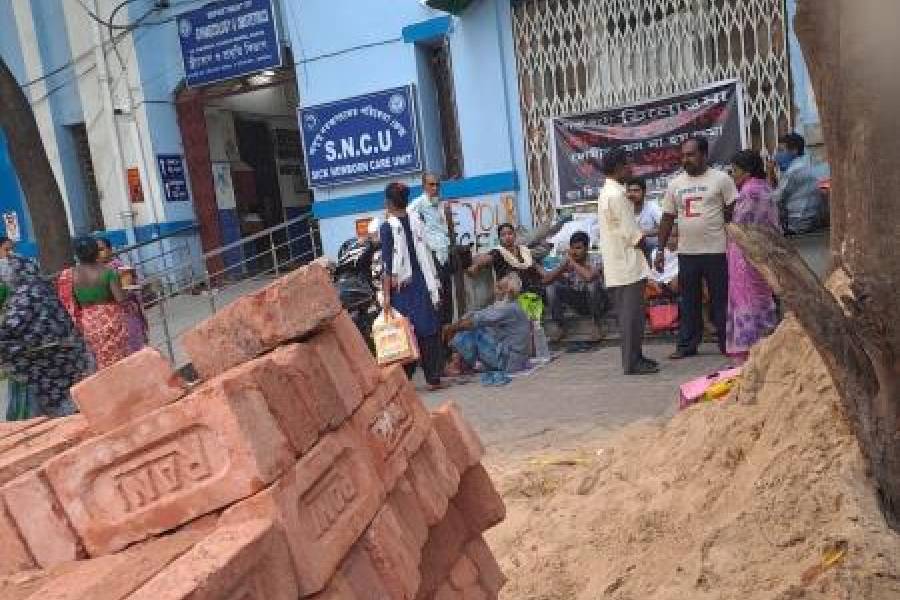Police and CISF personnel stationed at the main entrance and the gates of various buildings; heaps of sand and bricks dumped all around — that was how RG Kar Medical College and Hospital looked like on Tuesday.
There is a flurry of construction activity, PWD engineers said. Rest rooms for doctors and nurses are being built anew or renovated, and new washrooms and changing rooms are being constructed in various buildings.
Trauma care building, men’s hostel, gynaecology building, surgery building and cardiology building are among the ones where construction is going on.
Truckloads of sand and bricks are arriving almost daily and the bosses have set a deadline for the engineers.
“We have a week left to complete the construction and repair of washrooms and rest rooms for doctors and nurses and changing rooms for the other staff,” said a senior engineer of the PWD’s civil department.
“Our superiors are inspecting the sites to prevent shoddy work.”
At the police outpost on the ground floor of the emergency building, cops were seen scanning footage of CCTV cameras installed across the campus.
Outside the room, two police officers were listening to complaints from a patient’s relative.
In all, 532 new CCTV cameras have been installed across the RG Kar campus since a junior doctor of the chest medicine department was raped and murdered inside a seminar hall on the third floor of the emergency building on August 9.
“The 532 cameras were installed in the first phase. Over the next two phases, another 500-plus cameras will be installed in a number of buildings, including trauma care, emergency, outdoor, surgery and gynaecology,” said a senior engineer of the PWD’s electrical wing.
“The installation points have been selected based on the recommendations from the principal and the superintendent of the medical college.”
Outside the first-floor office of the engineer, cartons of new LED lamps were lying adjacent to white copper wires.
“The corners that were earlier ill-illuminated are now brightly lit. We are now installing ACs in the newly constructed rooms where doctors and nurses will rest,” the engineer said.
On Tuesday afternoon, nurses said the situation has changed over the last two months since the CISF assumed responsibility of RG Kar’s security following an order from the Supreme Court, which had taken suo motu cognisance of the rape and murder.
Nurses said two senior colleagues go on their rounds between 10pm and midnight every day before an audit is carried out of the number of patients admitted and discharged during the day.
“Every night, the nurses are accompanied by two CISF guards, one armed and the other unarmed. They wait outside the wards,” said a nurse who refused to be identified.
“The officers have provided a control room number which we have shared on our WhatsApp groups. It works. Two nights back, we found an employee drunk and alerted the control room. CISF personnel immediately arrived, took him away and conducted a breathalyser test.”
The door-frame metal detectors at the buildings housing various departments have CISF and police personnel as well as guards hired by the medical college around them.
This correspondent was stopped by a guard engaged by the medical college when he tried moving upstairs from the ground floor of the emergency building.
A senior police officer said the height of the boundary wall of the campus is being increased from 5ft to 8ft. “Barbed wires are being installed over the wall as an additional layer of security,” the officer said.
“Arrangements are being made to set up frisking rooms for male and female visitors and install baggage scanners.”
“Certain steps have been taken but it’s still too early to say whether these are enough to secure our workplace,” said a postgraduate trainee doctor who refused to be named. “We still don’t know how long the CISF will remain deployed here.”











